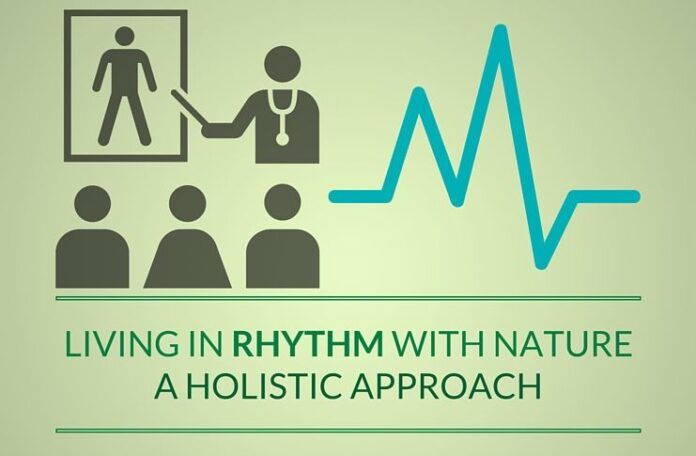
In this series of posts, PGurus brings excerpts from Prema Raghavan‘s just released book titled LIVING IN RHYTHM WITH NATURE – SIMPLE STEPS TO HOLISTIC HEALTH. The book is published by Bharatiya Vidya Bhavan.
Chapter 1
What is Holistic Health?
The body is your temple. Keep it pure and clean for the soul to reside in. ~B.K.S. Iyengar, Yoga: The Path To Holistic Health
Nature and Healing
I live in Vadodara, a small city in Gujarat. Life here proceeds at a relaxed pace, unlike larger metro cities with their attendant pressures. The landscape is dotted by small houses, colourful gardens, chirping birds, grazing animals and warm inhabitants. I have had the chance to meet many wonderful people here from different walks of life, including industrialists, writers, doctors, academicians, social workers, creative artists, accountants and engineers. Friendly congregations at each other’s homes are common, where we pray, talk and partake of the various cuisines offered by a cosmopolitan group of people who have come from all corners of the country to make this city their home.
When I host people for a meal in my home, some limit what they eat due to digestive problems. Others talk about eating and sleeping well and yet feeling a constant sense of fatigue. I often share tips on digestion and home remedies with them and they invariably come back with very positive responses, even for certain chronic problems. This made me appreciate the remarkably short period in which a change in lifestyle and attitude could transform our lives.
Friends often come over to talk and share some of their day- to- day problems. I listen to them and allow them to vent their feelings. This by itself reduces stress levels to some extent. I suggest a few minor changes in their daily routine which I feel may be beneficial. For example, an author was stuck in the middle of her work in a vicious cycle of tension and sleepless nights. I gave her a few tips for restful sleep and suggested some yoga nidra exercises. This was enough to resolve the issues and her book was launched within a month with good reviews. On another occasion, a traumatised mother, who had lost her son in a drowning accident, came to me through the referral of a friend. She was distraught and struggling to return to a life of normalcy. She gradually recovered with moral support and lifestyle changes and now helps other people in similar situations. Nature played a powerful role in their healing and this book is a result of my reflections on these interactions.
We all share a universal ideal to work towards a world where people are healthy, happy, and free of suffering. When we look around us, however, we see economic turmoil, ecological erosion, crime, disease and injustice – to a degree that can often be overwhelming. If we wish to transform the world we all experience, we have to first start with ourselves. We can create lasting change in the world only if we start with our own individual healing.
In my search for wellness, I began to understand there is so much we don’t know about our mind and body. The ability to cultivate an inner silence, the discipline to sustain constructive habits, the values that lend themselves towards a life of sincerity and sacrifice, the warmth that binds us to ourselves and the world around us – these are all important aspects of well-being that must be explored and nurtured if we are to rediscover our own true nature which Hindu tradition describes as the blissful state of Sat Chit Ananda.
Principles of Ayurveda
It is useful to understand the philosophy of Ayurveda as it is linked with the principles of holistic health and healing. Ayurveda is an ancient Indian medical system that is based on the unique natural constitution of each person. According to Ayurveda, the body is made of the five elements – earth, water, fire, air and space. The hard parts of our body correspond to the earth, the liquid parts to water, the warm parts to fire, the parts that move other parts to air and the vacant parts to space.
From these five elements and their properties come the three energies known as doshas – Vata (Space & Air), Pitta (Fire & Water) & Kapha (Water & Earth) – that construct and maintain our physical bodies. The three gunas of Sattva (transcendence), Rajas (activity) and Tamas (inertia) are the primal qualities that create the essential aspects of nature – matter, energy and consciousness – and underlie the mind.
In our natural state, the three doshas arrive at a natural equilibrium which determines our physical constitution, with one typically dominant dosha. People with a dominant Vata constitution would be more agile, reflecting the elemental qualities of air and space. A Pitta constitution would similarly indicate a fiery personality while a Kapha one would lend itself to a calmness akin to earth and water.
The gunas determine our mental constitution and can be consciously refined and balanced by our environment, thoughts and actions. Sattva combines the energy of Rajas and the stability of Tamas to maintain health and wellness.
The natural equilibrium of doshas is influenced by our thoughts, emotions, actions, the food we eat, our lifestyle and all other stimuli that affect our minds and bodies. When we live in a sattvic manner that is aligned and consistent with our own intrinsic nature, these doshas remain in balance and keep us healthy. When we deviate from our natural state, our doshas get imbalanced and affect the intrinsic harmony of the body and mind. When these imbalances are left unchecked and allowed to grow they result in the manifestation of disease.
For example, a person with a dominant Pitta would be more prone to heartburn when eating spicy foods and a blander diet would allow his Pitta dosha to not get aggravated and imbalance his system. Ayurvedic treatments are accordingly customised for each person based on their nature and usually involve changes in diet, lifestyle modifications and herbal treatments.
The basic principles of Ayurveda provide us with an appreciation of:
- our interconnectedness with nature and the elements
- the natural energy balance within us
- the influence of our thoughts & actions on this energy balance
- the importance of living in alignment with our own nature to lead a healthy and happy life
To be continued…
- Corona and consciousness - April 15, 2020
- When conscience is corrupted - February 14, 2018
- From 2G to Jio: The Last Laugh in Telecom - December 26, 2017




Nice book with excellent information.